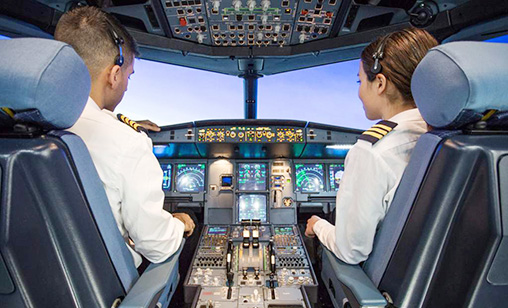Special Report: Training
Survey reveals gender discrimination in crew training sector
The serious imbalance between male and female pilot numbers has been widely discussed. A new report reveals the same barriers exist for woman pilots in the airline training sector.
April 1st 2022
A new report has shone a light on significant gender discrimination and a lack of gender diversity among pilots in the airline industry with a specific focus on the airline pilot instructor role. Read More »
The findings of the Royal Aeronautical Society (RAeS) and the University of the West England (UWE Bristol) joint report is based on survey responses from more than 700 airline pilots worldwide, 750 personal testimonials and eight hours of focus groups.
 |
Among the study’s major findings were extremely concerning incidents of overt and covert sexism and sexual harassment towards women, including frequent reports of an “old boys’ network”, the study reports.
Some 42% of the female respondents surveyed said they had been treated differently at work and 30% said they had been discriminated against because of their gender.
Male pilot respondents also felt there was a lack of role models for females and that the low female numbers in cockpit training was historical due to low numbers of female pilots flying with commercial airlines.
Released in March, the report was co-authored by Captain Marnie Munns, an airline pilot at EasyJet, chief executive of the RAeS, David Edwards, and professor Susan Durbin from the University of Western England in Bristol.
Airline training specifics of the survey revealed women make up 5.26% of the global pilot workforce, but the numbers of female pilot trainers are even lower. For example, in the UK, 0.9% of Type Rating Examiners (TREs), a category of airline trainer, are women.
The authors said sexism and sexual harassment is mostly kept secret in the airline industry because it lacked safe reporting processes. Additionally, female pilots feared being labelled as “difficult”. The study’s author described some of the findings as “shocking” and said not all of the episodes were included in the report to ensure respondents retained anonymity.
“This independent (RAeS) report reveals the experiences of pilots and pilot trainers across the UK and in the international airline industry. It is clear from the findings the industry is a long way from achieving gender equality,” its authors said.
| 'Encouraging women to join the industry is difficult “but persuading women to remain in the industry is even more of a challenge” with airline pilots indicating bias and discrimination are the two primary factors that discourage women from joining and then remaining in the profession' |
| International Federation of Airline Pilots Association September 2021 |
RAeS CEO Edwards agreed. “As the airline industry recovers from the devastating impact of COVID, it should look at any lessons that can be learnt, especially around part-time employment, which has shown to work during this period,” he said.
The survey report said the “full-time rule” applied by the airline industry will not make the pilot trainer role more gender diverse. It does not tap into the diversity of talent waiting in the pilot pipeline.
In the survey report, pilots and pilot instructors suggested options to replace the “full-time rule” included:
* Offering training roles at an airline’s home base
* Job share options and flexible working hours to help with childcare and make the role more family-friendly.
“The evidence is clear. There is an appetite amongst male and female respondents for the [instructor] role to be offered on a part-time as well as a full-time basis, especially among pilot trainers already in the role. Will the airlines and training schools listen to this? We hope so,” the survey authors said.
An initial broad-based initiative to increase female flight instructors would be more advocates for women amongst the pilot trainer, management and training departments at airlines, the survey said.
Bills Sarah says:
November 21st 2023 11:42am